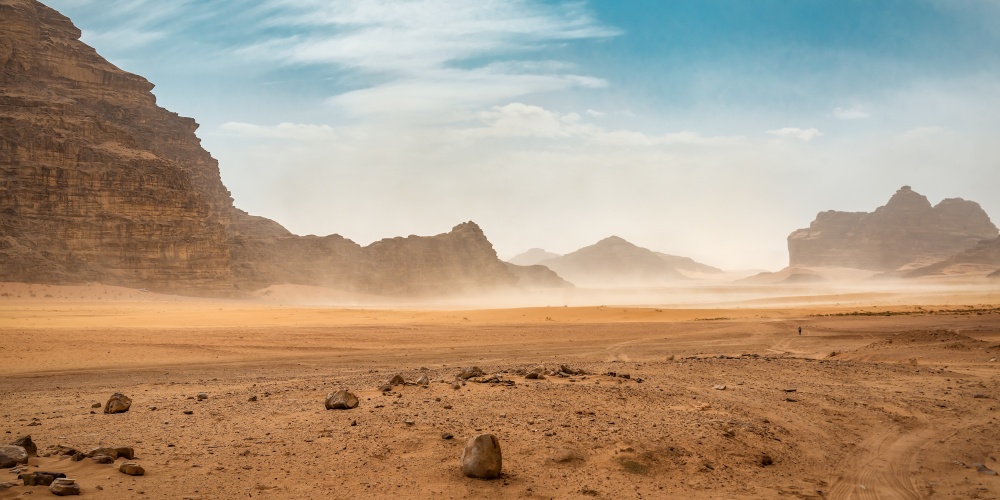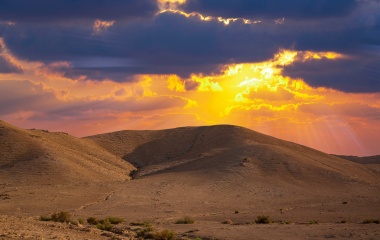
Ask anyone with a rudimentary knowledge of the Bible why Moshe could not enter the Land of Israel and more likely than not they will tell you because he “hit the rock”. Yet while we are told that Moshe hit the rock we are never told that is why he was punished. Rather that is the explanation Rashi[1] gives in explaining what G-d meant when He declared, “Because you did not believe in Me, to sanctify Me in the eyes of the children of Israel, therefore you shall not bring this congregation to the land which I have given them” (Bamdibar 20:12). Most other commentaries disagree with Rashi and suggest many other possible sins Moshe may have committed.
Yet whatever the “sin” was, this does not seem to be how Moshe understood why he could not enter the land. “But the Lord was angry with me for your sakes and would not hear me: and the Lord said to me, Enough; speak no more to me of this matter” (Devarim 3: 26). Moshe appears to blame the people for being denied entry to the Land. This is not the first time we hear Moshe expressing such a sentiment. Just two chapters earlier, at the beginning of sefer Devarim, Moshe tells the people, “The Lord was angry with me because of you, saying, ‘you not go there [Israel]” (Devarim 1:37). It is your fault, not mine, that I can’t enter the land, Moshe declares, seemingly contradicting G-d’s reasoning for not letting him enter the land.
Moreover, Moshe is talking in the context of the sin of the meraglim, spies, claiming that it was this sin that caused him not to enter the land. But was it not the incident at Mei-Merivah where Moshe drew water from the rock – something that took place 38 years later that was the cause of being denied entry to the Land?
In Sefer Devarim Moshe argues that the initiative to send the spies came from the people. “Then all of you came to me and said, ‘Let us send men ahead to seach out the land for us and bring back word on the route we shall follow and the cities we shall come to” (Devarim 1:22). In parshatShelach Lecha, where the actual story is recorded, it is Moshe who came up with the idea. If we take the view that sending the spies itself was sinful – after all the Jewish people had miraculously experienced how could they not believe G-d would successfully bring them into the land? – Moshe is blaming the people for suggesting the idea in the first place. Yes I agreed and sent them but had you not asked it would not have happened.
This would be an expression of Moshe’s frustration and anger that he was at times driven to. Just a few verses earlier he was the first to use the expression Eicha, lamenting the constant complaining and bickering of the people. “Eicha, how can I bear unaided the trouble of you, and the burden, and the bickering!" (Devarim 1:12). And while Moshe’s entry to the land was not directly due to the sin of the spies it led to 40 years of wandering and eventually to the sin that did him in. Had there been no spies Moshe would have triumphantly led the people into the Land.
Besides painting Moshe in a somewhat negative light such an argument would be unlikely to sway the people – which was the goal of his words. Hearing Moshe evading responsibly for his actions and blaming events of 40 years prior for his predicament now might even cause ridicule and cynicism towards their leaders. Furthermore, many commentaries see nothing wrong and everything right with Moshe sending spies. “One may not rely on miracles” our tradition teaches. There may have been miracles in Egypt and the desert but once the people would enter the land life would be natural - no longer could wars be won by looking heavenward (see Shemot 17:11 re Amalek).
Rather, Moshe was saying something much more powerful. His fate was sealed with the sin of the spies. Not because he did anything wrong, but rather because he was the leader of the people. And the leader of the people must suffer the fate of the people. A leader who sees himself as above the people is not worthy of the title. Such a person is an opportunist, not a leader. Once the people had to die in the desert Moshe had to die with them.
It may not be fair but leadership is about becoming one with the people, celebrating their successes and feeling their pain. Fair has nothing to do with it. This is what Moshe is conveying to the people. Once it was decreed your parents had to die in the desert it was decreed that I too would die – even if I am otherwise worthy to enter the land.
In parshat Vaetchanan Moshe uses a somewhat different phrase to express this same idea. Whereas in parshat Devarim the word used is biglalchem, because of you, here Moshe uses the word lema'anchem, for your, the people’s, sake.
Moshe pleaded to be allowed to enter the land – maybe an exception could be made and he could enter not as leader but as a retiree – and G-d told him, No Moshe, No exceptions can be made. It is true that you deserve it but for the sake of the people I cannot allow it. For the people to have trust in their leadership, for them to be able to follow Yehoshua (something Moshe exhorts them to do over and over again) they have to know that the leaders have their backs100% and are not part of some privileged class.
This was apparently something Moshe had difficulty accepting and G-d finally had to tell him “Enough! Never speak to Me of this matter again!” (Devarim 3:26). The fact that we hear these words not from G-d but from Moshe telling the people what G-d told him, indicates his acceptance and understanding of this – and Moshe does never raise the issue again[2].
For the sake of the people Moshe had to die in the desert. To do otherwise would have led the people to lose trust in their leader, leaders chosen by G-d. And this would be the ultimate desecration of G-d’s name.
After the story of Korach, the Torah is silent for 38 years. The Torah then picks up in year 40 with the death of Miriam. This would a natural time for Moshe to ask G-d if he could enter the land. At the same time it was in Miriam's merit the Jewish people had water in the desert. With her death there was a sudden lack of water.
After Moshe brought forth the water and he was hoping to lead the people to Israel G-d had to declare, "because you did not believe in Me, to sanctify Me in the eyes of the children of Israel [3] therefore you shall not bring this congregation in to the land which I have given them”.
[1] Too many people including many with much more than a rudimentary understanding of the Bible often blur the line between the text and its interpretation.
[2] One might think this is not surprising but considering how much “chutzpah” Moshe has demonstrated in arguing with G-d in the past one would have expected this not to have been the last word.
[3] While Moshe's leadership was doomed with the sin of the spies it could well be that if not for the incident at the rock G-d would have made an exception and let Moshe enter as a civilian.



